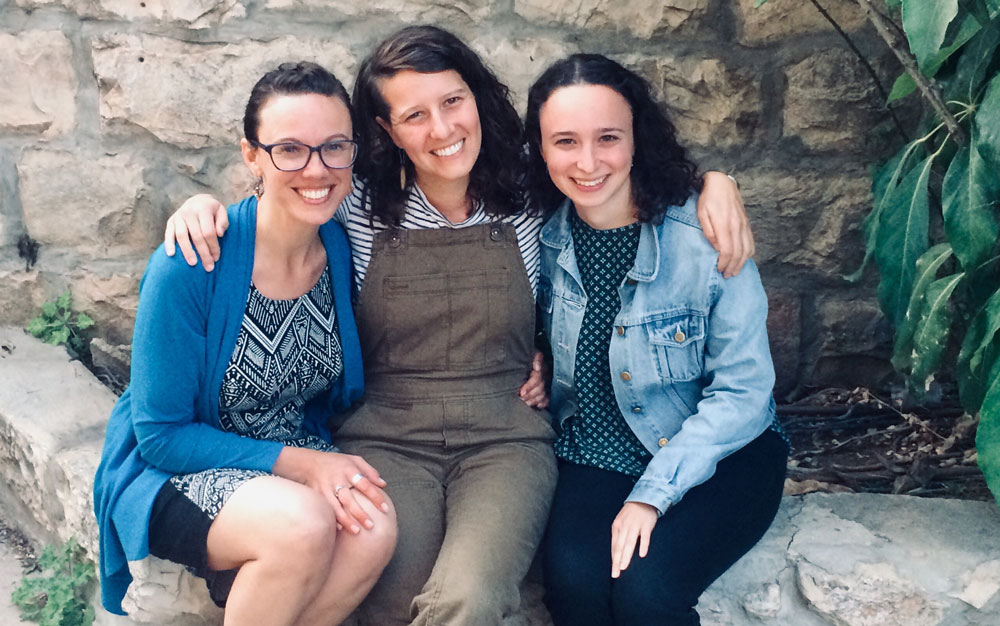Community Blog Balevav: Hebrew College’s Reimagined Rabbinical Year-in-Israel Program

On Wednesday afternoons, seven Hebrew College rabbinical students gather at an apartment in the German Colony, a beautiful neighborhood of Jerusalem, to talk, sing, reflect, study Torah and Tefillah, sip tea, munch on olives or chocolate, and support one another on their year-long journey in Israel.
The students are part of Hebrew College’s new year-in-Israel program for third-year rabbinical students called Balevav, or “In the heart,” which reimagines the year-in-Israel experience to better speak to the contemporary realities of Israeli society and the North American rabbinate.
Funded by the San Francisco-based Germanacos Foundation, the program connects students with Israeli teachers, mentors, peers, communities, and organizations so they have the opportunity to develop relationships while abroad and learn about the rich intellectual, spiritual, and cultural creativity of Israeli society. The program also encourages students to take advantage of learning opportunities that are uniquely available to them while living in Israel.
“Our approach to rabbinic education is one that places relational learning at the center,” said Hebrew College President Rabbi Sharon Cohen Anisfeld. “Our new Israel program enables students to foster meaningful personal relationships with Israel and Israelis, and invites them to see their time in Israel as part of an ongoing spiritual journey in which they are both inheritors and innovators, generous recipients and creative agents in the story of the Jewish people and the process of interpreting Torah for our time.”
Almost all North American rabbis spend an extended period of time studying in Israel as part of their rabbinic training so they can provide thoughtful and well-informed educational and communal leadership on the subject of Israel. But many rabbinical students in Israel remain relatively isolated within an ‘Anglo bubble,’ where they spend much of their time in classes with other visiting students from America, and do not engage fully with the rich diversity and vitality of Israeli society.
Beginning this year, Hebrew College students in Israel have been paired with host families from Kehilat Zion, a spiritual egalitarian community in Jerusalem, as well as mentors — including teachers, communal leaders, artists, writers, activists, and others — who can serve as role models and dialogue partners to help them understand and navigate Israeli society. Kehilat Zion is also serving as a “sister community” for students, hosting shabbatonim at the beginning and end of the year and offering other opportunities for learning, leading, and volunteering.
This spring, students will participate in a seminar on environmental sustainability and coexistence with The Arava Institute, a leading environmental studies and research program in the Middle East, where they will engage with peers from Israel, Palestine, Jordan, Egypt, and elsewhere in an immersive setting and explore their role as future religious leaders in responding to today’s pressing environmental challenges.
Throughout the year, Hebrew College students will study Talmud, Tanakh, halakhah, and other subjects with world-renowned Israeli teachers who model powerful Jewish learning, including Rabba Tamar El-Ad Appelbaum, Dr. Elie Holzer, and Dr. Ronit Irshai. They also engage in ongoing learning and reflection on their experience with Hebrew College alumna, and Israel Program Coordinator Rabbi Minna Bromberg who made aliyah five years ago and lives in Jerusalem with her husband and daughter.
“We hope to inspire and empower the next generation of North American Jewish rabbis to be deeply connected to and engaged with the vision of Israel and Zionism that we hold dear – a spiritual, humanist vision that fuses Jewish culture and creativity with a commitment to democracy, religious pluralism, and human rights,” Rabbi Anisfeld added.
For next year’s Israel cohort, there will be an intensive two-day seminar at Hebrew College in January, approximately six months before students leave for Israel, which combines educational sessions focused on contemporary Israeli society and culture with interactive sessions designed to help students articulate and share their personal relationships to Israel.
Following the seminar, students will take a spring course in Israeli history, thought, and literature, so that they can approach their own experience in Israel with historical context and depth. And as their Israel experience draws closer, students will be encouraged to develop their own learning goals for the year and will be asked to design a project that engages them both personally and creatively with the experience.
Beginning next year, students will receive summer funding that gives them the opportunity to spend the summer studying in an Israeli ulpan program to attain proficiency before the academic year begins. They will also have continued Hebrew language study in fall semester.
“The more fluency program participants can achieve, the more they will be able to develop meaningful relationships with Israelis and take advantage of the unique learning opportunities available to them while in Israel,” Rabbi Dan Judson, Dean of the Rabbinical School, said. “The new program allows our students tremendous opportunities to understand and explore Israeli society. We are so grateful to the Germanacos Foundation for providing resources to allow for this to happen.”
Upon their return, students will participate in a one-day seminar, thinking about how to translate their experience when they teach about Israel. They will also develop a plan to share their personal project from the year-in-Israel program within the Hebrew College student community and/or in their internship setting.
Anne Germanacos of the Germanacos Foundation, who has offered her apartment in the Germany Colony as the meeting place for the Hebrew College cohort, says she considers the students to be co-creators in forming the new program.
“It’s both a privilege and a thrill to be able to get to know them,” said Germanacos, who met students in Israel a few weeks ago. “They’re marvelous! Every single one! They are such an interesting group of people, with such a diverse array of experiences. My curiosity is peaked: How will this immersive year in Israel act on them as human beings and thus as rabbis? I’m so honored to be able to participate in the education of these remarkable students and eager to watch their trajectory unfold.”

